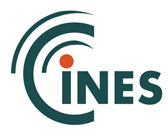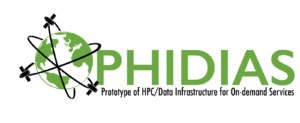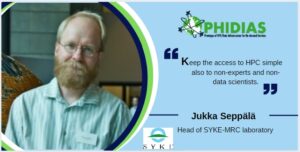During the PHIDIAS Kick-Off Meeting on September 24 and 25 2019, consortium members were interviewed by Trust-It.
You can find their videos online on the project’s YouTube page: https://www.youtube.com/channel/UC8rKfnURUua008pM8n_M50A/featured
And here is the written interview of Jukka Seppälä, Seppälä, chef de service à l’Institut Finlandais pour l’environnement (SYKE).
PHIDIAS and the contribution of SYKE
PHIDIAS’s overall objective is to build a prototype for Data/High-Performance Computing (HPC) services based on Earth sciences cases. In this respect, the consortium will develop and provide new services to discover, manage and process spatial and environmental data produced by research communities tackling scientific challenges such as atmospheric, marine and earth observation issues.
This consortium, led by CINES, the French National Computing Centre for Higher Education, will take advantage of the expertise in marine research of Finnish Environment Institute (SYKE), whose role in the project is to provide excellence in marine environmental data collection and analysis, for various needs, thereby contributing to the Ocean Use Case, working towards improving the use of cloud services for marine data management.
Using HPC to combine marine environmental data from different sources
According to Jukka Seppälä, head of SYKE-MRC laboratory, there are two main assets that the Finnish Environment Institute will showcase participating in PHIDIAS, which are:
- providing examples on how to combine marine environmental data from various sources, since often the data are collected through methods that are not well harmonized;
- showcasing the use of HPC in improving the analysis of new types of data, e.g. imaging of marine organisms.
Therefore, PHIDIAS will provide HPC capacity for analyzing and combining data from different sources, resolving long-needed requirements for data processing.
SYKE’s purpose in joining the project is to forward the merging of new types of biological data collected with physical and chemical data, thereby improving the holistic assessment of specific phenomena and events in the marine environment. The outcome will be the development of shared platforms, practices and software tools for scientific communities fostering the easy generation of products using data from various sources.
For this reason, Jukka Seppälä appeals the consortium and the HPC community to “keep the access to HPC simple also to non-experts and non-data scientists”.
If you want to discover the benefits of standardised Data/HPC services for the earth sciences visit www.phidias-hpc.eu and join PHIDIAS community by signing up here.
Visit our social media channels to keep updated with the latest news.


